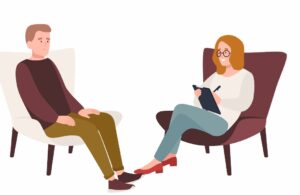If you think that you or someone you know might be struggling with OCD, it is important to get a proper diagnosis. OCD can be a very serious mental illness if left untreated. In this blog post, we will discuss the symptoms and treatment options for OCD. We hope that this information will help you or your loved one get the help they need!
Contents
What Is OCD Diagnosis?
OCD diagnosis is the process of determining whether a person has OCD. This can be done through a variety of methods, including psychological evaluations, interviews, and observations.
The goal of an OCD diagnosis is to identify the presence of OCD symptoms and rule out other potential causes. There are several ways to diagnose OCD. Some of the common steps involved in OCD diagnosis include:
Taking a medical history 
The medical history will help to rule out any other possible causes of the symptoms and the diagnostic tests will help to confirm the diagnosis. Medical history is taken to rule out any other possible causes of the symptoms. This will include questions about family history, current medications, and any other mental or physical health conditions.
The mental health professional will also want to know about any previous treatment for OCD or other mental health conditions. He may ask you the following questions :
- What are your main concerns?
- When did you first start noticing these concerns?
- Have the concerns been continuous or intermittent?
- How severe are the concerns?
- Do the concerns interfere with work, school, or social activities?
- What do you think might be causing the problems?
- What have you done in the past to try to relieve the symptoms?
Conducting a physical examination
The process of diagnosing OCD usually begins with a physical examination. This is to rule out any other possible medical conditions that could be causing the symptoms. The doctor will also ask about your family history and any previous mental health conditions. They will then examine you physically.
The mental health professional will ask about your thoughts, emotions, and behaviors in more detail. They may also ask you to perform some tasks to assess your level of compulsions and obsessions. A diagnosis of OCD is usually made based on the presence of certain symptoms, including:
- Excessive worry about certain things or themes (e.g., contamination, germs, illness)
- Recurrent and persistent thoughts that are intrusive and unwanted (e.g., images of harm coming to oneself or others)
- Avoidance of certain situations or objects due to fear of triggering anxiety or other negative emotions
- Compulsive behaviors such as excessive hand washing, cleaning, checking, or ordering
- Engaging in these behaviors to try to relieve the anxiety caused by the obsessions
- Experiencing distress when unable to perform the compulsions
- Symptoms that interfere with daily life, work, and relationships
Ordering and interpreting laboratory tests
Laboratory tests can play an important role in the diagnosis of OCD, as they can help to rule out other potential causes of the symptoms. Blood tests may be ordered to check for conditions that can cause similar symptoms, such as thyroid problems or anemia.
Imaging studies, such as MRI or CT scans, may be ordered to rule out other potential causes of the symptoms, such as a brain tumor. In some cases, a lumbar puncture (spinal tap) may be done to collect cerebrospinal fluid for testing.
Some other tests in this regard include the Y-BOCS test, which is a questionnaire that is used to assess the severity of OCD symptoms, and the Maudsley Obsessive Compulsive Inventory (MOCI), which is a self-report measure of OCD symptoms.
Referring the person to a mental health professional
After conducting an initial evaluation, the doctor may refer the individual to a specialist for further evaluation. A specialist may use different techniques to assess whether an individual has OCD, such as clinical interviews, psychological testing, and observation. Observation may involve watching the person perform tasks or activities that trigger their OCD symptoms.
If you think you or someone you know may have OCD, talk to a doctor or mental health professional about getting an evaluation. Early diagnosis and treatment of OCD can improve quality of life and help prevent the development of more severe symptoms.
What Are The Challenges?
There are a few challenges that can make OCD diagnosis difficult.
Difficulty Admitting The Disorder 
First, people with OCD may not want to admit that they have a problem because they fear being seen as crazy or different. OCD is often characterized by perfectionism and an excessive need for control. This can make it difficult to admit that there might be a problem.
OCD sufferers may worry that seeking help will make them look crazy or different. This fear can prevent people with OCD from getting the diagnosis and treatment they need. For example, a person with OCD might be too embarrassed to tell their doctor about their compulsions.
Habit Of Hiding The Symptoms
Second, many people with OCD try to hide their symptoms from others, which can make it difficult for family and friends to notice the problem. One of the challenges in diagnosing OCD is that many people with the disorder try to hide their symptoms from others. This can make it difficult for family and friends to notice the problem.
For example, someone with OCD might avoid certain places or activities because they are afraid of getting germs. This might be mistaken for a fear of social situations, which is a symptom of social anxiety disorder.
Often Mistaken With Other Ailments
Finally, OCD is often mistaken for other conditions such as anxiety or depression. This is because the symptoms of OCD can be very similar to those of other mental health disorders. For example, people with OCD may experience intrusive thoughts, avoidance of certain situations, and excessive worry.
For example, people with OCD tend to have very specific and ritualistic behaviors that they feel compelled to perform to relieve their anxiety. These behaviors may be time-consuming and interfere with daily life. People with OCD may also avoid certain situations or objects because they fear them triggering their obsessive thoughts or causing them distress.
People often mistake it to be anxiety because the person avoids any potential causes of anxiety. However, people with OCD know that their thoughts and behaviors are unreasonable, but they cannot help it. This is a challenge in OCD diagnosis because it can be difficult to distinguish between OCD and other mental health disorders.
What Are The Benefits?
The benefits of OCD diagnosis are many and varied.
The most important benefit is that it can help people suffering from OCD to understand their condition and realize that they are not alone.  A diagnosis can also provide sufferers with a sense of relief, as it can help to explain why they have been experiencing certain symptoms. In some cases, a diagnosis may also lead to improved access to treatment and support services.
A diagnosis can also provide sufferers with a sense of relief, as it can help to explain why they have been experiencing certain symptoms. In some cases, a diagnosis may also lead to improved access to treatment and support services.
Finally, an OCD diagnosis can help to reduce the stigma associated with mental illness, by raising awareness and understanding of the condition. If you or someone you know is struggling with OCD, please don’t hesitate to reach out for help. There is no shame in seeking assistance, and there are many resources available to those who need it. With the right support, people with OCD can lead happy and fulfilling lives.
What Can Be The Treatments After Diagnosis?
Once an OCD diagnosis is made, treatment can begin. Treatment options for OCD include:
Cognitive behavioral therapy
Cognitive behavioral therapy (CBT) is a type of psychotherapy that can help you manage your OCD. CBT can teach you how to recognize and change the thoughts and behaviors that are causing your OCD. It may help you to: 
- Understand your OCD and how it affects you
- Learn ways to cope with your OCD symptoms
- Challenge the thoughts that are causing your OCD symptoms
- Reduce or stop the behaviors that are causing your OCD symptoms
Exposure and response prevention
Exposure and response prevention (ERP) is a type of CBT that involves gradually exposing yourself to the things that trigger your OCD while learning to resist the urge to engage in compulsive behaviors. This form of therapy may help you to:
- Face your fears and learn to control your anxiety
- Recognize that your OCD thoughts are not true
- Resist the urge to engage in compulsive behaviors
Acceptance and commitment therapy
Acceptance and commitment therapy (ACT) is a type of psychotherapy that can help you to accept the things that are out of your control and commit to taking action in areas that are important to you. This form of therapy may help you to:
- Accept your OCD symptoms without trying to change them
- Learn ways to manage your OCD symptoms
- Focus on living a meaningful life despite having OCD
Dialectical behavior therapy
Dialectical behavior therapy (DBT) is a type of CBT that focuses on helping you learn how to cope with difficult emotions. DBT may help you to:
- Identify and change the thoughts and behaviors that are causing your OCD symptoms
- Learn how to better manage your emotions
- Improve your relationships with others
Medications
Commonly prescribed medications include selective serotonin reuptake inhibitors (SSRIs), which can help reduce the symptoms of OCD. 
OCD compulsions and obsessions can be reduced with certain psychiatric medications. Antidepressants are often the first line of treatment. Antidepressants to treat OCD include:
- Clomipramine (Anafranil) is an antidepressant that can be used to treat the major depressive disorder in persons 10 years of age and older.
- Fluoxetine is for adults and children 7 years and older
- Fluvoxamine is for adults and children 8 years or older.
- Paroxetine (Paxil, Pexeva) is a selective serotonin reuptake inhibitor (SSRI) that is only used to treat adults.
- Zoloft is a prescription medicine that can be effectively used in children, adolescents, and adults 6 years of age or older.
Your doctor, on the other hand, may prescribe alternative antidepressants and psychotropic medications.
Your doctor can help you figure out which medication is right for you based on your symptoms, other health conditions, and any other medications you’re taking.
It can take some trial and error to find the right dose. You may need to start at a low dose and increase it slowly over time. It can take several weeks or months to find the right dose. Be patient and work with your doctor to find the best treatment for you.
If you’re considering one of these therapies, talk with your doctor to ensure that you understand all the benefits and drawbacks, as well as any health concerns.
Conclusion
OCD diagnosis is not an easy task but a professional can help in this process very smoothly.OCD treatment options are available and you should consider them after the successful completion of OCD diagnosis. Lastly, OCD can be a debilitating disorder but with the proper treatment, you can manage and overcome it well.
If you think you or someone you know may have OCD, please consult a mental health professional for diagnosis and treatment options. Remember, you are not alone. There are many resources available to help you on your journey to recovery.
Seek the remedy and you will find the OCD diagnosis. Trust in your doctor and never give up on seeking what is best for you. You can conquer OCD with the help of the right strategy and the right treatment. It slowly becomes a thing of the past as soon as you know the art of handling it well.
Professional Guidance is the first step to moving toward your healing journey. You can try reaching Therapy Mantra to seek expert help in the comfort of your own home. Our therapists will help you get a solution to manage and overcome your problem. You can book your online therapy and talk directly to your assigned mentor. You may also download our free OCD treatment app on Android or iOS.




